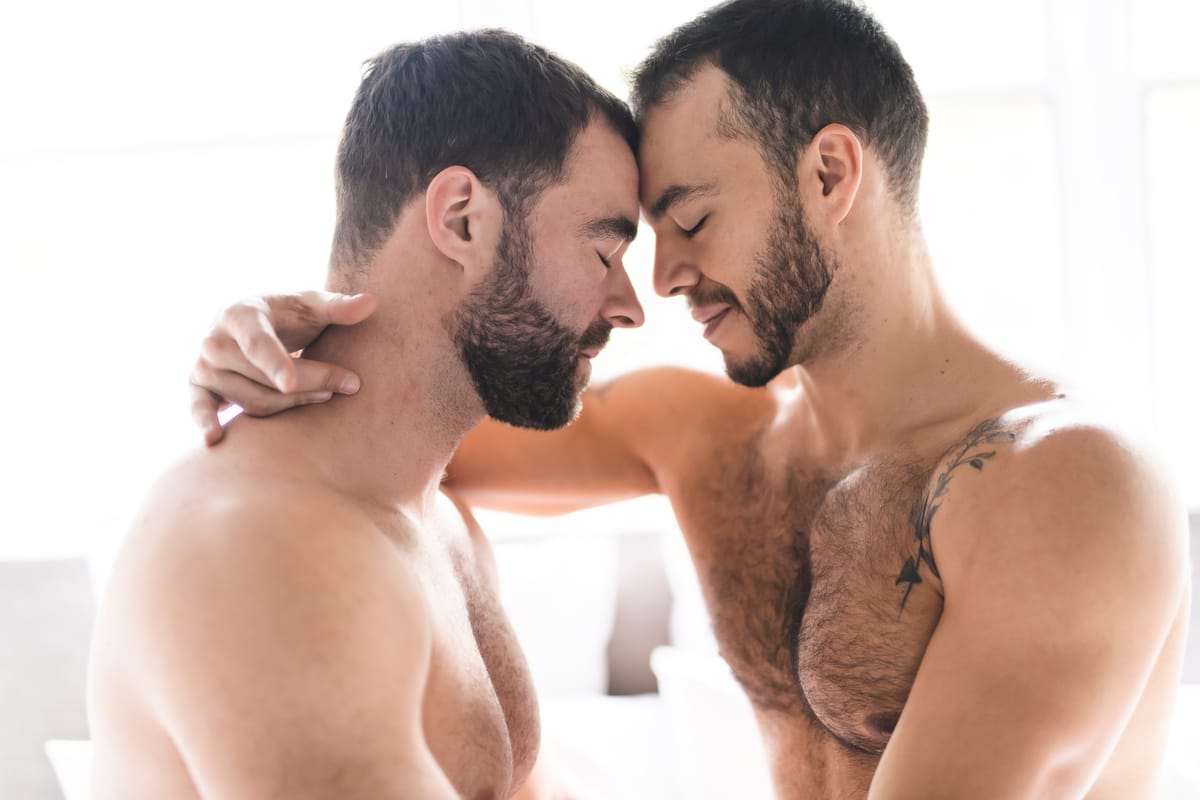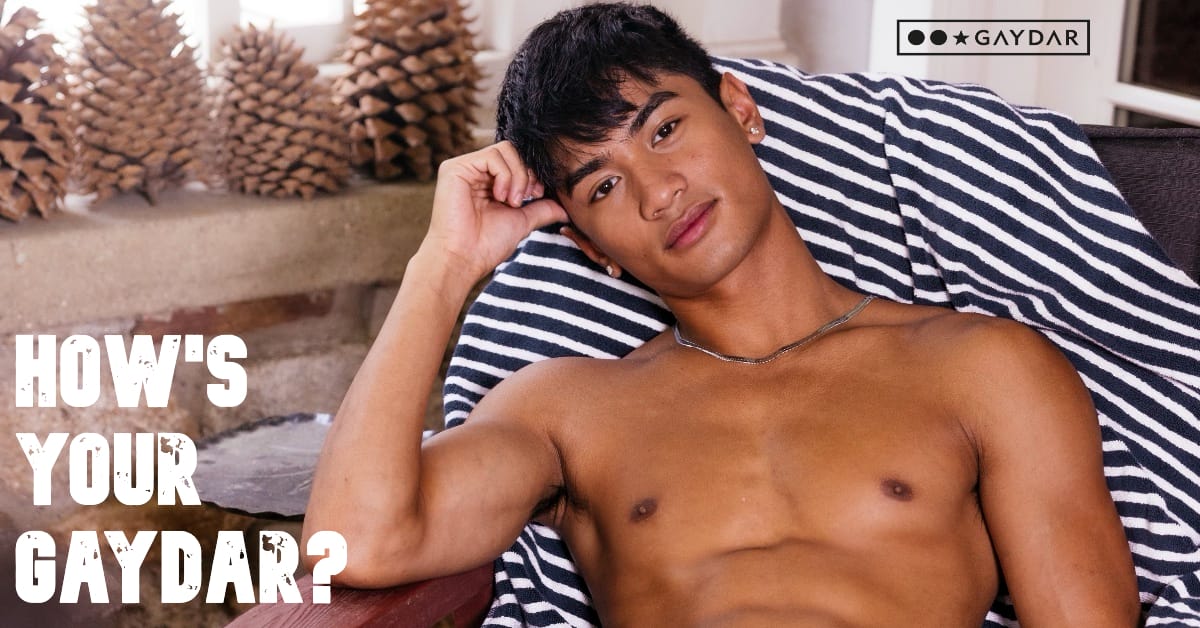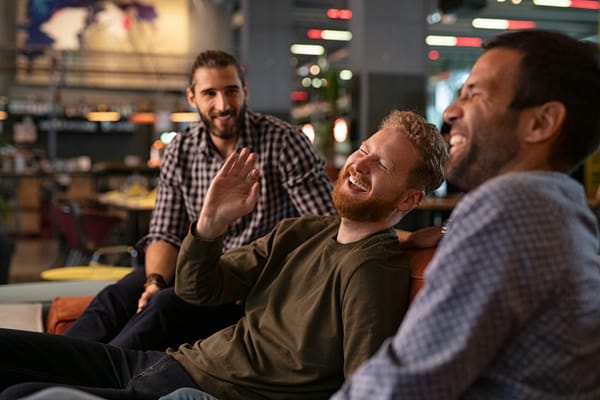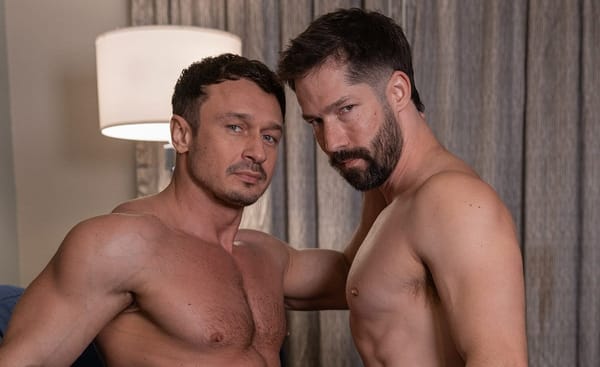Are you ready for Deeper Dating?
Ken Page shares his insights on how to attract lasting love.

For our podcast, How To Date Men, we caught up with Ken Page - the man behind Deeper Dating, helping people navigate the search for love.
In the conversation, we talk learning the skill of intimacy, navigating a culture of unkindness, and our longing for community.
As a psychotherapist, what led you to focus your work on the world of dating and relationships?
My endless singlehood and my desire for a relationship!
I was what I called chronically single for decades. And I was one of these people that really wanted a relationship.
I think I was like almost 30 before I had any relationship last more than six weeks. So I kept trying to the same things again and again. They weren't working.
I was a psychotherapist, I was teaching, so I really had to become a student of what I was doing wrong. I actually created a support group for Chronically Single Gay Shrinks, because there are so many of us. And I learned as I went along. And what I learned was kind of profound to me.
When I started seeing differences in my own dating life, I tried to bottle that and turn it into a map. And I've spent decades doing that and teaching that. And I've been in a wonderful relationship and marriage now for 16 years, so I kind of live those same ideas now as when I was in my single life, but I teach them all over the place to single people all around the world.
Do you think the experience of having to effectively fix yourself from a dating perspective gave you the confidence to then give advice to other people to say, well, I'm coming from a place of personal experience?
Absolutely. Although there was this weird period before I found my husband where my book was getting close to coming out and I remember saying to my editor, even though I know I believe in this people are gonna call me a hypocrite because I'm out here with this book and I'm still single. He said to me - well, you never know what will happen between now and when it gets published.
By the time the book came out, my husband was celebrating this with me.
You teach four steps to the deeper dating process. Can you just talk a little bit about what those four steps are?
This is the biggest thing that I learned. If you try to date from the outside in by following all this dating advice that tells you how you have to fix yourself and change yourself and act more confident and flirt better, basically you're screwed because the outside in approach is always going to leave you in that state of what they call compare and despair. It'll always be trying to get you to change yourself.
But really, if you want to find not just a relationship, but a relationship that can last, you need to actually lead with who you are, your most authentic self. That is brave. That is scary. It is beautiful. And it's how you attract someone where the relationship really could last.
Because if you're trying to be something else, one of two things are going to happen. You're going to find somebody who's looking for somebody other than you. Or you're going to find someone who senses your weakness, your insecurity, your vulnerability, your fear of being who you are, who wants to take advantage of someone like that. So it's kind of the path to pain.
The wiser path is this first step, which is learning to lead with what I call your core gifts, your true self, your heart, your essential self, who you really are. And that's where your magic lies. And we are not taught that.
But in my work of meeting so many people in bad relationships and so many people in wonderful relationships, I really know that that is the key. So that's step one.
In my intensives that I lead - I'm on my 24th intensive now, and it's the very first one that I've ever done just for men who love men - that's where we start, helping people realise, what are my core gifts? What are the real parts of who I am? That's your magic, that's how you're going to find love.
The second stage is to become a student of your attraction patterns. That means not just fixating on how attractive you are, but actually focusing on who am I attracted to and who am I attracting. And when you actually notice those patterns, you've got gold because it teaches you what to look for and what to stay away from.
And any time when you look at your past relationship history and you find certain negative qualities that you've been drawn to again and again in the guys that you've been meeting, you know what to stay away from, you know what to look for, but also it shows you the parts of yourself that you have not yet learned to honour and dignify. Because if you honoured those parts, you wouldn't have ended up in those relationships. That's stage two.
Stage three is the getting out there, which Gaydar is a powerful tool for, and I'm going to talk a little bit more about how to use Gaydar and other apps differently. But that's the third stage is getting out there in a different way, leading with who you are and actually asking two questions that you are now going to reframe your entire search for love around and it will change your future.
The two questions are, do I feel emotionally safe with this person? Like I could tell they're not a liar. I could tell they're real. I could tell they have a generosity of spirit. I can tell that there's a goodness about them. I could tell that they're not nasty to wait people when we go into a restaurant together. But also, do I feel seen by this person? Do I feel like he gets who I am? Obviously you have to be sexually attracted, you have to be romantically attracted. That's a given. But when you make those your two first questions, I promise you that you will save yourself buckets of pain and you'll steer your way to happiness so much quicker.
And then the fourth stage is like when you meet someone like that, the rewiring that has to happen sexually and romantically. That's the journey that's going to get you to the kind of love that can last.
You said that you're about to run your first intensive for men who love men - is it different for men who love men? Is there something specific or unique about same sex relationships in that context, or do the same principles apply universally?
The same principles absolutely apply universally, but with some differences. Because I led retreats for gay men for almost a quarter century and ran therapy groups for gay men. But then I moved into this deeper dating work and in all of my cohorts, almost, there were gay men, but it wasn't exclusively gay men until this one.
I've learned that gay men have a particular kind of wounding. There's like a level of loneliness that we have experienced that's different than most other people. And there's a way that we have kind of been traumatised. Even younger people. I'm 69 years old. I certainly have gone through like so much of those old gay history phases. But even for younger people, I think it's true as well. I think we are particularly scared to trust. And I think there are some defences that we have that are different. I think that's one thing that's true.
But I also think we have a magic about us that is different than other people as well. And if you did the research on kind of like longitudinal studies of different cultures and particularly indigenous cultures, you'll find again and again that it was the gay people who were chosen to be the shamans, the spiritual teachers. This is true largely across the board because there is this kind of mix of gentleness, sensitivity and magic that we have that can lead to a kindness in relationships and connection that's different than other people.
Who are the men that come to you looking for help?
Straight, gay, queer, non-binary, anything in between, the biggest factor is wanting healthy, loving relationships. That's the biggest factor of all. Underneath that is a desire for self-acceptance.
The most important skill for a human being is learning the skills of intimacy. And we're not taught that. So that's really a huge one. I think professional growth is another. I think dealing with trauma is another one. So I think those are kind of the key ones that I experience.
There's another one that we queer men have in a huge way, which is the longing for community, the need for community, good, positive community.
In terms of those commonalities that you're describing, is the flip side of that the barriers that people are trying to navigate to get to the relationship, the intimacy that they're looking for?
There are a number of barriers. One barrier, of course, is internalised homophobia. That's one barrier. And then for people who are living in cultures or environments where they're not fully embraced, that's a barrier. And we're talking about many countries where you can be jailed or killed for being gay.
Even in the queer men's community, there are a lot of barriers there too. There are the barriers of too much drinking, too much drugs. There are the barriers of the apps that can actually lead to anxiety and depression. How do you meet people? The more you've got environments where you can meet people in kind of calm, safe, positive ways, the better you're going to do at finding love and positive community.
So, you know, a lot of the barriers exist within our culture itself as well as the kind of homophobic culture. And then singles culture across the board is a culture of unkindness in a lot of ways.
When you think about the types of relationship that people are looking for when they visualise what intimacy would look like for them, what a loving relationship would look like - can you describe what that aspiration is?
I'm going to start with two things that the research shows are vastly likely to lead to the end of a relationship. And I say these things with no judgment. But the two things are, if one of the partners or both of the partners has an active addiction, - whether it's alcohol or drugs - that's going to lead to a real problem.
If people have unstabilised serious psychiatric disorders - such as bipolar disorder or severe depression - there is a 90% chance the relationship is going to fail over time.
Another of course is abuse - emotional abuse, physical abuse, gaslighting, someone who is prone to lying, narcissism.
So then, what are the things you are looking for? Well, I think the key thing that you're looking for is honesty and not game playing. So I think that applies in a million different ways. And I think that that applies in monogamous relationships. If you make a contract of monogamy that you and your partner are going to keep it.
If you have an open relationship or a polyamorous relationship, I think a lot of polyamorous relationships make a huge mistake, which is they live in the grey area and they're not really upfront. It is so important to be upfront because in a grey area, each side of the couple is going to translate things into what they think is best for them. So clarity and truth is hugely important in any long-lasting relationship.
Another one is kindness and generosity. That's hugely important, like a quality of goodness and an ability to communicate. Those things are really basic.
And then I think shared goals are really a wonderful thing. Whatever those goals are, the goals might be we love to travel. The goals might be we need to share in a project where we're doing good for the world. The goals could be being there for our families. The goals could be having children. The goals could be any one of a million different things. It doesn't matter, but shared goals make a huge difference.
So I would say the real keys are shared goals, a deep commitment to kindness and honesty and truth.
For anybody who's searching for a partner, I have a recommendation for you. You probably have really fixed set ideas about the age range difference, the weight, the tallness and the physical distance. I would say to you, stretch out every single one of those with this question. If I felt like this guy could be my soulmate, would I still tolerate that he lived 50 miles outside of my range? Would I say no to this person if I knew he was my soulmate and he lived a thousand miles outside of my range or he was five years older or five years younger than my range? Everybody stretch out your ranges and then see if the person is worth all the extra effort that it would take to deal with that stretch in your range.
You don't know what you like until you've tried it?
My husband is blond and green-eyed. Never did I used to go out with someone who was blond and green-eyed. It just didn't happen. I love him, he's gorgeous, but I had to kind of stretch a little bit.
What happens is that physical, sexual and romantic attraction grows with connection. Nobody teaches us this but it's research-based and it's absolutely true. In my book, Deeper Dating, I have an entire chapter on what do you do when you're kind of attracted but not attracted enough.
But the thing that I want to say about that is no matter how wonderful a person is, you are not obligated to be attracted to them if you're not attracted. So you don't want to add pressure, but you want to give a little bit of space to see if things grow.
It's almost the opposite of the transactional nature of the way that we navigate dating and intimacy in today's world. It's very much swiping until someone's profile photo catches your attention. You'll have one hookup and never want to see them again. You don't have the time or the headspace to allow things to grow because you're already moving on to the next encounter, the next hookup, the next whatever?
That's absolutely correct. Also, when you're doing that quick swiping thing, you are actually much more likely to make bad choices instead of good choices.
How does your work as a dating coach shape your own experience of relationships and intimacy? Are you perfect husband material?
No, far from it, far from it. I'm a husband. I am a father of three. I'm a son. I'm a sibling. And there is not a day that goes by that I am not humbled by my clay feet when it comes to love and my issues. So, welcome everybody to the world of just being a human being. If you're breathing, you have fear of intimacy. It's that simple. The question is, what do you do with it? Are you able to admit your stuff? Are you able to work on the relationship?
I'm a very imperfect husband in a lot of different ways, but I'm willing to work on the relationship and I really do my best to tell the truth and to show my love. I keep trying. And I think that's pretty good for a human being.
If someone was wanting to change their relationship status and try and meet someone to build a relationship with, what advice or guidance would you give them?
I'm a deep believer in couples therapy. I think it makes a huge difference. So what I would say is if you and your partner are at a real stuck point, a relationship is a really precious thing. It's a really big, big, big deal. Also, the quality of your spousal relationship is the single greatest indicator of the quality of your life. Even more than health. So this is a big deal and you worked hard to get this relationship. If you're stuck, get help. Get help.
Watch out for like the dropping off of sex. Keep having sex. That's a big deal. That's really, really important. And even if you're having less sex or you're not having sex, do physical things to stay connected. Naked cuddling. But sex is better. Sex is better.
So keep the physical going, keep the kindness going, keep telling your partner what you love about him. These are things that make a huge, huge difference. Watch out for the tendency of drift which happens in every relationship - work against that drift and get the help that you need.
Also take vacations and have adventures - that is clinically proven to make a really huge difference.
The NSFW edition
If you want to admire some man-on-man action, our NSFW edition gives you every inch.
Sign in and check out our NSFW content - it's free!








